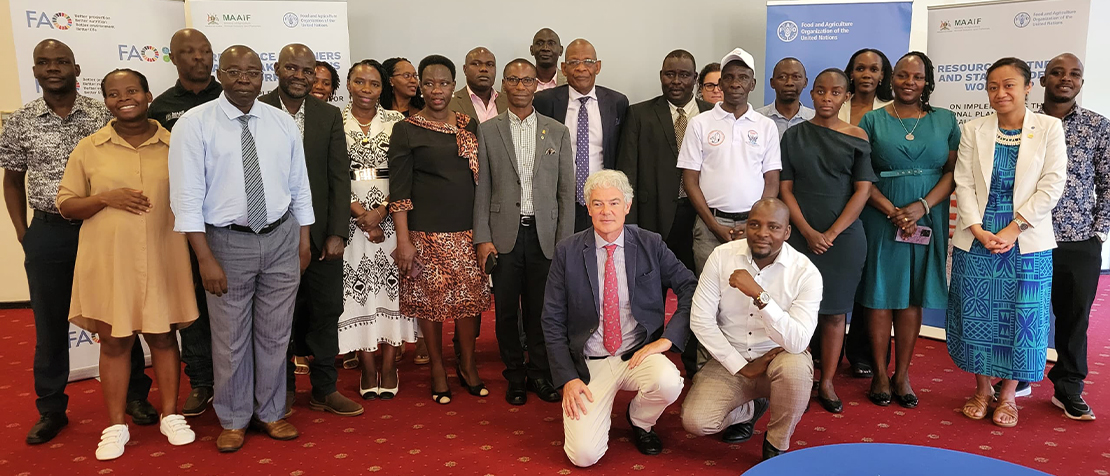Stakeholder’s Conference on the National Plan of Action for Sustainable Small- Scale Fisheries (NPOA-SSF)

Participants at the Stakeholder's Conference for Uganda's National Plan of Action for Small-Scale Fisheries (NPOA-SSF) in Kampala, 14 March 2025
©Joshua Kagoro
A Stakeholder’s Conference on Uganda’s National Plan of Action for Sustainable Small- Scale Fisheries (NPOA-SSF) was held on 14th March 2025 at the Serena Conference Centre in Kampala. The event brought together key local stakeholders including central and local government, small-scale fisheries organizations or support organizations, non-government organizations (NGOs) and development partners.
The objectives of the conference were to: i) Raise awareness about Uganda’s NPOA-SSF and its priority areas for engagement and support; ii) Engage in dialogue with relevant stakeholders about how they can support the implementation of the NPOA-SSF; iii) Strengthen political will and commitment to advance the implementation of the NPOA-SSF.
The conference was opened by the Permanent Secretary for Ministry of Agriculture, Animal Industry and Fisheries (MAAIF) represented by the Commissioner for Fisheries Resources Management and Development, Mr. Bwanika Joseph. In his remarks, Mr. Bwanika shared the mid-term Ministry’s strategy which focus on market access through three main pillars of i) increasing production, ii) management of post-harvest handling and, iii) value addition. He recognized that in order to promote sustainable implementation of the NPOA-SSF, there is need to recognize the roles of different actors and ensuring commitment from each one of them.
Commissioner for Fisheries, Madam Daisy Olyel, welcomed stakeholders to the conference. She recognized the role of the Food and Agriculture Organization of the United Nations (FAO) in developing and implementing the Voluntary Guidelines for Securing Sustainable Small-Scale Fisheries (SSF Guidelines), the global framework from which Uganda’s NPOA-SSF was developed. She also noted that the Uganda NPOA-SSF narrows down the global instrument to the context of Uganda and the next crucial step is implementation. She stressed that despite the funding challenge for the fisheries sector, government is very committed to the implementation of NPOA-SSF and concluded her remarks with a call to action for all stakeholders.
Fishery Officer, Ms. Mele Tauati from FAO headquarters, in remarks noted FAO’s recognition of Uganda as one of the African countries spearheading the implementation of the SSF Guidelines, including through the development of their NPOA-SSF and thus congratulated Uganda for these great efforts. She added FAO’s continuous support towards securing sustainability small-scale fisheries in Uganda despite limited resources and invited stakeholders and partners to support the implementation of the NPOA-SSF. Ms. Tauati also delivered a presentation about the SSF Guidelines and its linkages to Uganda’s NPOA-SSF to help set the scene of the conference.
Ms. Margret Nakato, the coordinator for Katosi Women Development trust (KWDT) importantly shared experiences on the ground based on the NPOA-SSF priorities from the perspective of women fishers and processors. She noted efforts and good progress made to organize women fishers and processors into groups. She also added that challenges with tenure still however exist and need to be addressed.
Mr. Valerio Crespi, Fishery Officer from FAO headquarters, presented on the Integrated Water Resource Management (IWRM) and how it relates to Uganda’s NPOA-SSF. In his presentation he noted the need to involve different stakeholders and actors that impact fisheries including agriculture, forestry and others.
During the plenary discussion session of the conference, several stakeholders noted their support towards the implementation of the NPOA-SSF and expressed their interest to engage in follow-up dialogues to strengthen and complement efforts and action on the ground. Key recommendations from stakeholders included:
- the need to enhance awareness of the NPOA-SSF in local fishing communities and ensure their effective engagement in its implementation, including youth groups;
- strengthen stakeholder collaboration including multi-sectoral approaches relevant to the sustainability of fisheries such as the IWRM;
- identify key resource partners and stakeholders already doing work on the ground to help mobilize additional resources (while recognizing ongoing efforts by different stakeholders supporting fisheries and the implementation of the NPOA-SSF);
- clarify and improve links between fisheries and aquaculture development.
Uganda successfully developed and launched the National Plan of Action for Small-Scale Fisheries (NPOA-SSF), which states that all capture fisheries activities in Uganda are small-scale in nature. The plan addresses eight strategic areas and best practices derived from the SSF Guidelines. Its primary objective is to enhance visibility and participation of small-scale fishers and fish workers in conservation and sustainable development of fisheries resources and the livelihoods that depend on them. The NPOA-SSF was developed in a participatory manner through key stakeholder consultations between 2022 and 2023 around the six major lakes of Uganda to identify and consolidate priority strategic areas and interventions to be addressed. The consultation was done by the National Task Force (NTF) headed by Government Focal point from DiFR. Other members of the NTF include representatives of small-scale fishers and fish workers, research, academia, women in fisheries, community-based organizations (CBOs) and non-governmental organizations (NGOs).
The conference was organized with the technical and financial support of FAO through the FVC project: “Implementing the Small-Scale Fisheries Guidelines for gender-equitable and climate-resilient food systems and livelihoods” phase 2. This article was developed by Sustainable Fisheries Initiative (SFI, Betty Aliba) and FAO.
